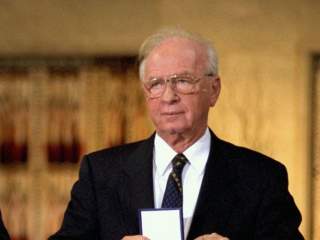An Assassin's Creed: Rabin and His Killer
Twenty years after Yitzhak Rabin's assassination, a new book examines the Israeli leader's legacy—and that of his murderer.
The direction of Israeli sentiment also is reflected in attitudes toward the assassination itself. Members of the Amir family, far from being stigmatized, lead normal and successful lives. Hagai Amir, who was released after serving sixteen and a half years in prison and is now a free man, told Ephron, “We have a lot of support.... People come up to us on the street and say it clearly.” Yigal Amir is still imprisoned, but a quarter of Israelis favor commuting his sentence. He already has won significant privileges concerning conditions of his incarceration, including being permitted to marry and have conjugal visits.
Israeli views of Amir’s act have been further softened by a variety of conspiracy theories that continue to have strong public support and that shift blame for the assassination away from the radical right wing and the individual from its ranks who actually killed Rabin. Certain tidbits from the crime scene feed those theories, such as an extra hole in Rabin’s shirt that does not correspond to the direction from which Amir was shooting. As Ephron was working on his book, Rabin’s daughter Dalia entrusted him with carrying the bloodied clothing to the United States so that an independent forensic expert in Arizona could examine it. The expert determined that the hole was not the result of a bullet; most likely it was made in the hospital while doctors were frantically trying to save Rabin’s life.
Ephron deserves great credit for carefully exploring the story of Rabin’s murder and its aftermath. He unites a reporter’s eye with keen analysis. His study offers a vivid portrait of forces and sentiments that not only destroyed one of Israel’s finest leaders but also, for years, have been destroying the prospects for Israel to be a peaceful, Jewish and democratic state.
Paul R. Pillar is a contributing editor of the National Interest and a nonresident senior fellow at the Center for Security Studies of Georgetown University and at the Brookings Institution.
Image: Wikimedia Commons/Government Press Office.

